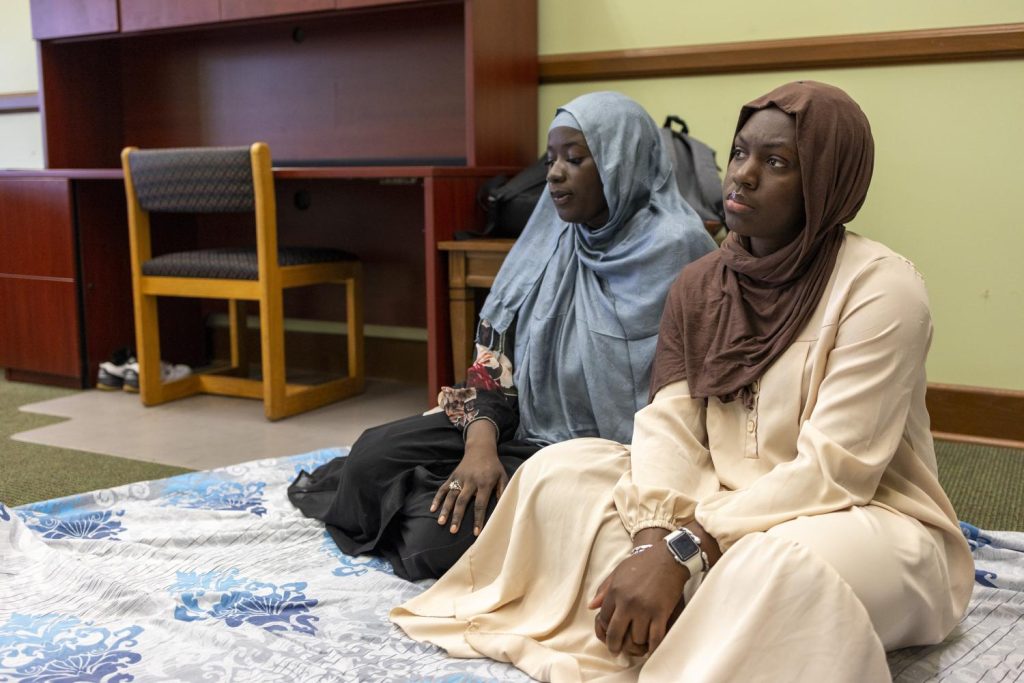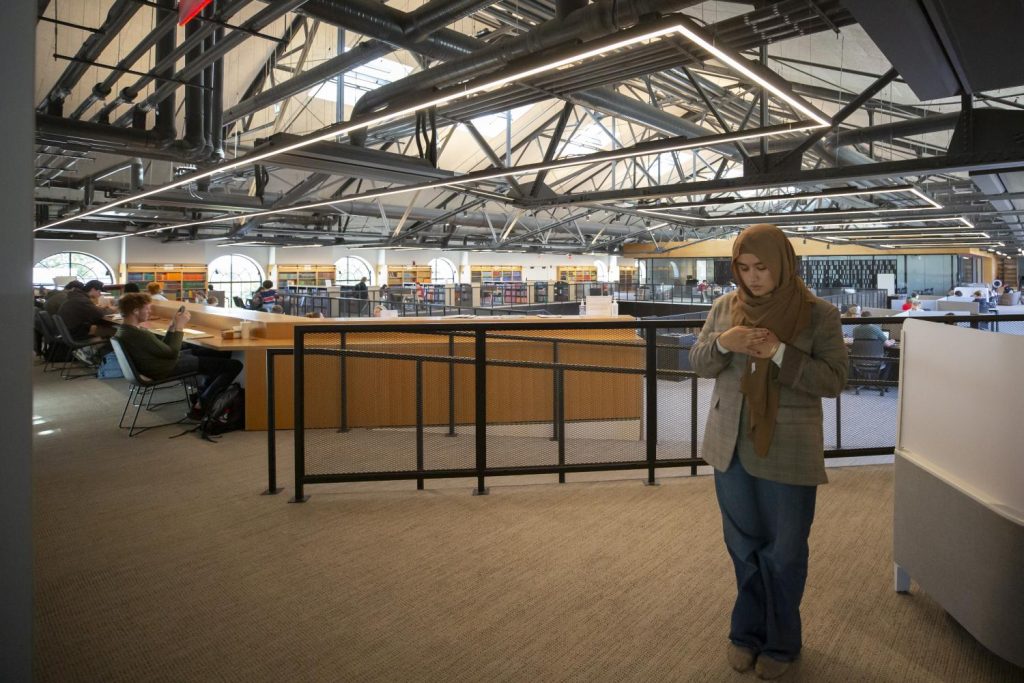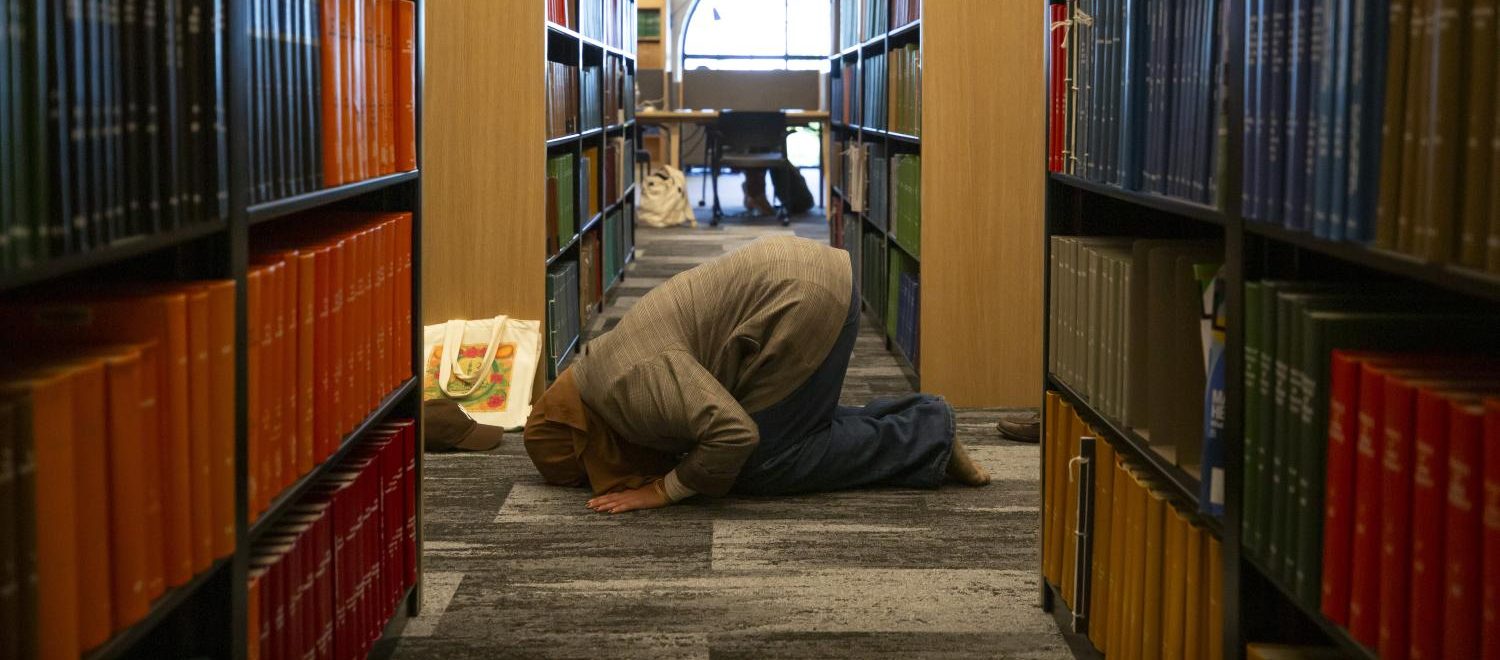The Muslim Student Association has been struggling to secure a designated prayer spot on campus since 2019, senior and Muslim Student Association President Miniratou Darbo from Lexington, Kentucky said.
Muslims have strict beliefs such as modesty, cleanliness, and being friendly, Darbo said. She said that one of the most important aspects of Islam is praying five times a day.
“Praying five times a day is like our one-on-one time with God, and it’s hard to get that alone time when the university doesn’t provide designated prayer spots,” Darbo said.
While praying, Darbo said Muslims face the direction of the Qibla, which is defined as the direction toward the Kaaba, a sacred shrine in the city of Mecca, Saudi Arabia.
Darbo said that while praying, a clean environment is vital. After going before the board multiple times, the administration told the Muslim Student Association, who declined to specify which board, to pray under a staircase in Downing Student Union. When they arrived at the staircase, Darbo said there was mold and cobwebs, which was not an acceptable place for them to pray.
Darbo said the religion of Islam is unlike any other. She said that it is a strictly monotheistic religion, meaning they only believe in one God, Allah, and view Jesus as a prophet and not the son of God.
Muslim Student Association brothers coordinator Jihad Mansour from Egypt, who plans all events for males, said that many of the universities he has visited have had prayer spots, whether it be an entire building or a small room.
In particular, the University of Kentucky administration has worked with their Muslim Student Association in sourcing prayer spaces, UK Muslim Student Association member Adam Agoub said via email.
“There is one designated interfaith prayer room in our student center that several members of the MSA frequently visit to perform prayer,” Agoub said. “Our MLK center has also been providing their office space for our Friday Jummah prayers as well.”
According to Pluralism.org, Jummah “refers to when Muslims gather for congregational worship during Friday midday prayer time.”

Mansour said that while there is a spot in Cherry Hall for Muslims to go to for Jummah, that spot cannot be used any other day. Bourini said the classroom used for these prayers also serves as a student lounge and is used for other student club meetings.
Agoub said he believes universities should provide an interfaith prayer room in every major-specific building, office, and library. He said that those locations see the most foot traffic and setting aside one room that would stay clean and wouldn’t be occupied for long should be simple.
“People don’t get that we need a space to do it in instead of being told to find a random corner or staircase,” Mansour said. “The situation is even harder for the girls.”
Mansour said that a lot of women come to campus without their hijab, which they need to wear when they pray. He said that having a designated prayer spot would allow them a place to store their hijabs.
WKU Muslim Student Association member Fahemah Bourini, a senior from Brentwood, Tennessee, said that they have to resort to praying in places that other students don’t often go to such as corners in the Commons or under stairwells in Jody Richards Hall.
“Honestly, it’s awkward when you pray and people walk by and stare at you,” Bourini said. “I always feel like I’m in the way of people trying to walk.”
Bourini said that local mosques in the area donated money for Muslims to be able to use the Chandler Memorial Chapel on campus, but that they have felt discriminated against in the chapel.
“The chapel is made available to all students, faculty staff, alumni, and friends regardless of religious affiliation,” WKU’s website states.
University Spokesperson Jace Lux said on behalf of the university that the chapel is open to individuals of all faiths and backgrounds. The chapel is available for prayer, meditation, and reflection during its regular operating hours, listed on the university’s events page. Lux said the chapel can also be reserved for use after hours through the Campus and Community Events office.
“The Campus and Community Events staff has confirmed that they have regularly collaborated with members of the Muslim Student Association to facilitate the group’s access to the Chapel and to keep them informed of its availability throughout the semester,” Lux said on behalf of the university.

Despite what the university says about the chapel being available to all religions, it is not always available at the times that Muslims need it, Bourini said. The five prayers always take place at dawn, noon, afternoon, evening, and nightfall.
Bourini said the chapel is first come first serve. This means that if another religious event is happening during the time they need it, they cannot pray there. It is possible to wait and perform all five prayers at night, Bourini said, but it’s not ideal.
“When other religions found out that we pray there, it’s almost like they started to try and get there before us because they know the times we pray,” Bourini said.
Mansour said that it is critical to the Islam religion to get a prayer space on campus as prayer is a very important part of being a Muslim.
“It’s not like we’re asking for a whole building to be a dedicated prayer spot, just a room where we could all go to talk to God,” Mansour said.
Bourini said that religion is a big part of many people’s lives, not just Muslims. However, she would like to see a change happen before she graduates in the spring and a prayer spot to become available for Muslims on campus.
“The school does a lot for other problems such as mental health, which is amazing,” Bourini said. “However, it would help us a lot if we were provided with a cleaner and private spot that is inclusive to the Islam religion.”


